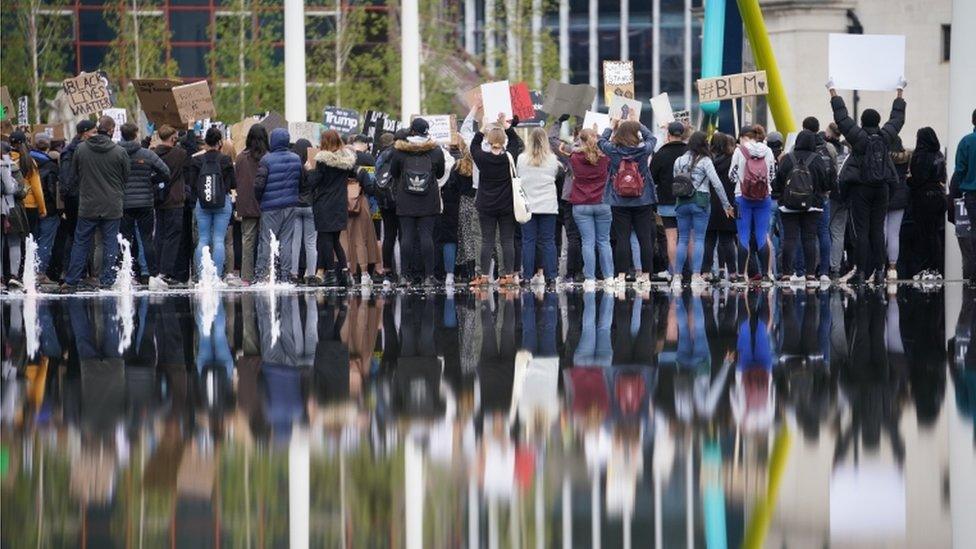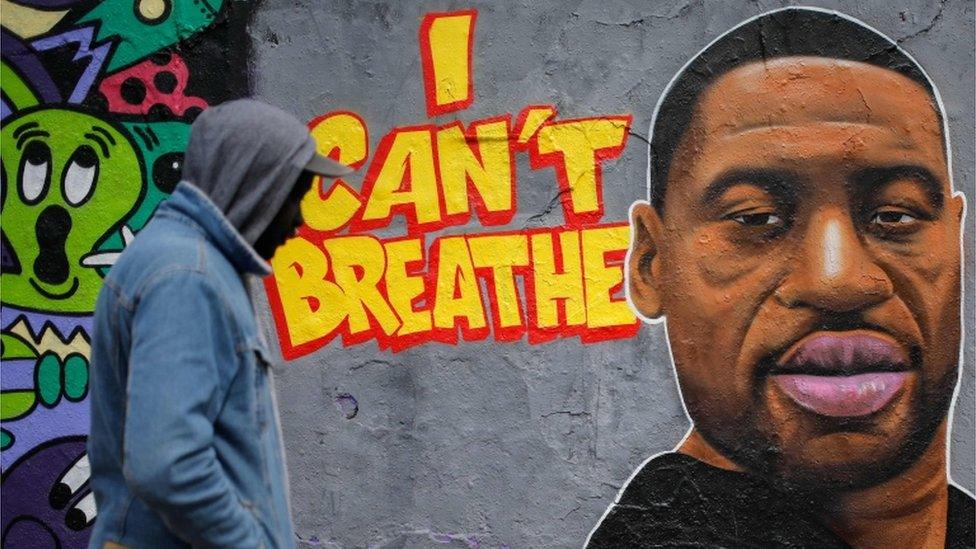George Floyd protests reveal double standards
- Published

Protest in Birmingham over George Floyd's death in police custody
Minneapolis to the Midlands is not a million miles
It's just a few miles short of 4,000 in fact, no more than a stone's throw considering how fast the shock and anger over George Floyd's death in police custody have swept around the world. Some of the strongest reactions have come in areas like ours which are home to diverse communities including those of African-Caribbean heritage.
The enduring rage, the sense of burning injustice, rekindles yet again the often toxic arguments surrounding racial discrimination and double standards in the treatment of white people and black people.
Dave Thompson, the chief constable of West Midlands Police, England's second largest force, recognised the significance of this right from the start:
"Young black people right across the West Midlands will rightly feel strongly about these events and the fact they are in the US makes no difference," he warned. "They affect how policing is seen on our streets."
Reminding us that he had a great deal of contact with policing in the States, he concluded: "It is so very different to what we have in the UK."
How fair is it for the demonstrators, including the thousands who gathered in Birmingham this week, to carry posters alleging that "the UK isn't innocent"?
Mr Thompson acknowledged serious concerns about recent incidents in which his officers had been accused of using unnecessary force against black men. The regional director of the Independent Office for Police Conduct, Derrick Campbell, confirmed that the IOPC was currently investigating nine such cases in Birmingham alone this year.

Democratic scrutiny
The police commissioner for the West Midlands, David Jamieson, takes the matter so seriously that he is giving the public an opportunity to question the police about their use of force. This must surely count as a clear example of democratic accountability in action. Remember, Mr Jamieson is himself an elected Labour politician.
Though the police here may have serious questions to answer, at least they are subject to political and investigatory scrutiny.
Compare this with the disturbing picture of policing in America which emerged during a BBC News at Ten report on Wednesday 3 June 2020 by Clive Myrie. Having covered the US on and off for nearly three decades, he told us:
"Policing in America is opaque. There is little transparency. Powerful unions can protect bad cops and the principle of qualified immunity means officers accused of misconduct are almost always given the benefit of the doubt. The policing system is fragmented to the point of farce. There are 18,000 different forces. In California, training can last 24 to 48 weeks. In North Carolina, just 16 weeks to become a police officer; half the time to become a licensed barber in the state."
So beware glib comparisons about policing on opposite sides of the Atlantic. They may be equally glaring examples of double standards.
Compound fractures
None of us needs to be reminded that the outrage surrounding the death of George Floyd coincides with the relentless and increasingly fractious atmosphere that's built-up during the Covid-19 emergency, like one thing on top of another.
Our BBC West Midlands News Online pages reporting on the protests here have been viewed in their hundreds of thousands, prompting Facebook comments which are mostly critical of the apparent disregard for social distancing. Some even venture that among those now taking such a tolerant view of the rules may be at least some of the campaigners who have been giving Dominic Cummings such a hard time over his "minor infringement".
Perhaps that's enough double standards for now.
